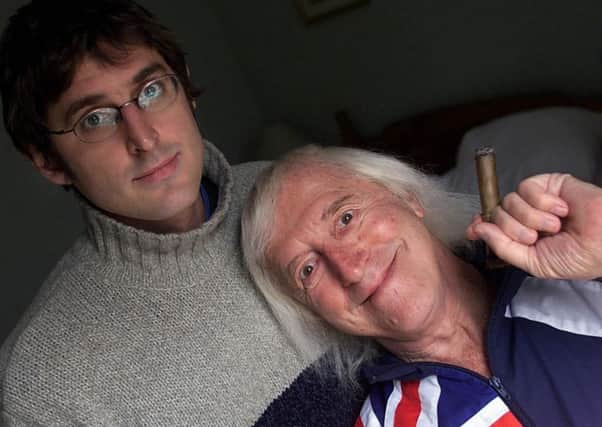Dani Garavelli: Don't abandon bid to exorcise abuse scandal


But the seminal moment came when the pair were travelling together in the back of a car, Savile puffing away on his trademark cigar. “Why do say you hate children when… you clearly enjoy their company?” asked Theroux.
“It’s easier for me, as a single man, to say: ‘Oh, I hate kids,’ because it puts a lot of salacious tabloid people off the hunt,” responded Savile. Questioned further, he explicitly denied he was a paedophile, but by saying the word on camera, Theroux put the allegations out there; he watered the seeds of doubt.
Advertisement
Hide AdAdvertisement
Hide AdIt is tempting to imagine that Theroux’s ability to manipulate Savile stemmed from a similarity in their MOs. Both of them invented alter egos, albeit with very different motives. Savile took on the guise of a flamboyant eccentric to hide his dark side, while Theroux has always affected a guilelessness to lure the famous into revealing more than they intended.
When the scandal broke, though, Theroux felt uncomfortable, especially about the quasi-friendship he had struck up with the DJ after the film. Should he have pushed harder in an attempt to expose his flaws? If he had, would it have stopped Savile offending?
In an attempt to atone, Theroux has produced a sequel which will be broadcast on BBC2 at 9pm tonight. In it, he interviews some of Savile’s victims and asks them if they believe he was hoodwinked, or in any way responsible. It seems an odd exercise in self-flagellation, especially given that Theroux did report allegations of sexual assault brought to him by a viewer the following year. But he comes across as an introspective sort of a guy, so it’s understandable that he keeps asking himself how he could have ignored what was, in hindsight, so glaringly obvious.
Theroux’s existential crisis is a microcosm of the one experienced across the country. The revelations about Savile, Stuart Hall, Rolf Harris, Max Clifford et al have left the nation without its bearings and examining its collective conscience. And the celebrity scandals lifted the lid on so much more that was rotten: widespread institutional abuse in state and religious-run schools, children’s homes and hospitals. Why was it covered up for so long? To what extent were we complicit? And what can be done to make sure it never happens again?
Four years on – with the child abuse inquiries north and south of the border in a near constant state of disarray – we are no closer to securing satisfactory answers. Victims too are in limbo. The Savile revelations offered them the tantalising prospect of being acknowledged, only for it to be snatched away by a failure to consult them over remit, structure and appointments.
Last week, the English inquiry suffered yet another setback. Just weeks after Alexis Jay was appointed its fourth chair, its two most senior lawyers stepped down. First, lead counsel Ben Emmerson QC, a man widely trusted by victims’ groups, resigned – shortly after the Independent Inquiry into Child Sexual Abuse (IICSA) announced he’d been suspended. Later, it emerged Elizabeth Prochaska had also quit, leading to speculation of a catastrophic breakdown in relationships.
In Scotland, we have fared little better: after an undignified spat with education secretary John Swinney in July, the chair, Susan O’Brien QC, resigned, with senior judge Lady Anne Smith stepping in to fill the breach. Though the inquiry was launched a year ago this month, there has been little visible activity.
Across the UK, there have been mounting fears that both inquiries are doomed; that their remits are too far-reaching and the amount of evidence they are expected to process excessive. In England, 13 investigations – each requiring public hearings – have already been set up at a cost of £100 million. Separate to these hearings, the inquiry has set up a Truth Project to take testimony from thousands of victims in five regional centres.
Advertisement
Hide AdAdvertisement
Hide AdNow some critics are calling on the government to cut its losses; they say the IICSA – which covers state and non-state-run institutions during an open-ended timeframe, was unrealistic and unworkable from the outset. Simon Jenkins has suggested the “yearning for individual justice”, while understandable, should yield to learning lessons and putting systems in place to ensure it never happens again. But the two are not mutually exclusive. Indeed how can lessons be learned, if witnesses are not heard?
Theresa May has a lot riding on the inquiry. As Home Secretary she fought hard to get it established, so it is unlikely to be scrapped any time soon. And Jay is already committed to reviewing its approach. One suggestion is that the number of public hearings should be reduced; another that there should be a lead counsel for every investigation so they can run in parallel. For progress to be made, those involved also need to set aside their personal differences for the greater good.
Whatever the challenges, both the Scottish and English inquiries need to press ahead. It’s important for the victims whose trust in authority has been repeatedly shattered. But it’s also important for the country as a whole.
The fallout from the Jimmy Savile scandal has left the UK – like Theroux – shellshocked and paralysed by self-doubt. Unless we can lay its ghost to rest, by finally getting everything out in the open, the crimes we closed our eyes to for so long will haunt us for another generation.